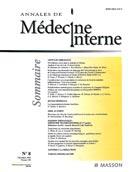Intérêt de transposer un examen américain dans le cadre du futur examen national classant validant français - 16/02/08
Jean-Paul FOURNIER [1],
André F. DE CHAMPLAIN [2],
Daniel BENCHIMOL [1],
Pascal STACCINI [1],
Raja SUBHIYAH [2],
Marc BRAUN [3],
Chantal KOHLER [3],
Bertrand GUIDET [4],
Pascal CLAUDEPIERRE [5],
Marc PREVEL [5],
Peter SCOLES [2],
Kathy HOLTZMAN [2],
David SWANSON [2],
Kathy ANGELUCCI [2],
Cathy MCGRENRA [2],
James GOLDBERG [6],
Patrick RAMPAL [1],
Donald MELNICK [2]
Voir les affiliationsIntérêt de transposer un examen américain dans le cadre du futur examen national classant validant français. Étude préliminaire |
Le programme et les modalités des études médicales en France sont actuellement en plein remaniement. Un examen national classant validant sera institué pour la première fois en 2004, reposant exclusivement sur des questions rédactionnelles. Cependant, ce type de question ne permet pas de garantir un niveau de fidélité élevé, indispensable à un examen d'enjeu important. Les questions à choix multiples (QCM) préparées par le National Board of Medical Examiners de Philadelphie permettent d'évaluer l'acquisition et l'utilisation des connaissances cliniques et répondent à cet impératif de fidélité.
L'objectif de ce travail était de tester leur utilisation auprès d'étudiants français en fin d'études médicales, après traduction et adaptation. Deux cent quatre-vingt cinq étudiants issus de quatre Facultés françaises ont passé simultanément un examen comportant 200 QCM, dans des conditions strictement standardisées. Leurs résultats ont été comparés à ceux d'étudiants américains de niveau d'étude similaire.
Cet examen apparaît valide et très fidèle. Leur moindre niveau de performance est essentiellement dû à un défaut d'entraînement et à un moindre niveau de motivation.
Ces résultats encourageants doivent être confirmés par une seconde étude, d'effectif plus important, tenant compte des lacunes identifiées dans ce travail préliminaire. Si ces premiers résultats étaient confirmés, ces QCM pourraient constituer une alternative raisonnable aux questions rédactionnelles retenues.
Transposition of an American-designed comprehensive medical student examination within the framework of the forthcoming French nationwide comprehensive examination. A preliminary study |
Medical training is undergoing extensive revision in France. A nationwide comprehensive clinical competency examination will be administered for the first time in 2004, relying exclusively on essay-questions. Unfortunately, these questions have psychometric shortcomings, particularly their typically low reliability. High score reliability is mandatory in a high-stakes context. The National Board of Medical Examiners-designed multiple choice-questions (MCQ) are well adapted to assess clinical competency with a high reliability score.
The purpose of this study was to test the hypothesis that French medical students could take an American-designed and French-adapted comprehensive clinical knowledge examination with this MCQ format.
Two hundred and eighty five French students, from four Medical Schools across France, took an examination composed of 200 MCQs under standardized conditions. Their scores were compared with those of American students. This examination was found assess French students' clinical knowledge with a high level of reliability. French students' scores were slightly lower than those of American students, mostly due to a lack of familiarity with this particular item format, and a lower motivational level.
Another study is being designed, with a larger group, to address some of the shortcomings of the initial study. If these preliminary results are replicated, the MCQ format might be a more defendable and sensible alternative to the proposed essay questions.
Mots clés : Examen validant national , Acquisition des connaissances , Évaluation , Questions à choix multiple
Keywords:
National licensing examination
,
Clinical knowledge
,
Assessment
,
Multiple- choice question
Plan
© 2003 Elsevier Masson SAS. Tous droits réservés.
Vol 154 - N° 3
P. 148-156 - mai 2003 Retour au numéroBienvenue sur EM-consulte, la référence des professionnels de santé.

